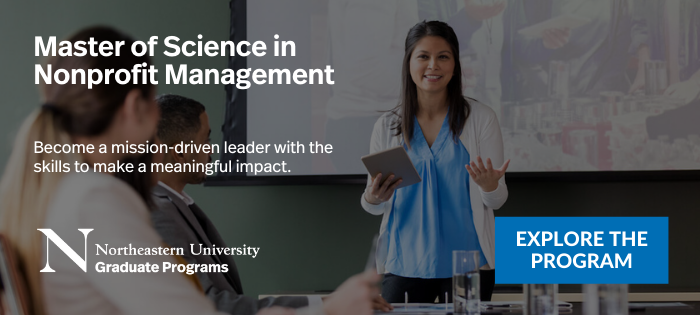When it comes to picking a career, professionals today are looking for more than just a paycheck. “Employees are more satisfied if they work in organizations that reflect their values and beliefs,” says Monica Borgida, lead faculty within Northeastern’s master’s in nonprofit management program. “This creates a personal level of purpose that makes a job more meaningful overall.”
One career path that many professionals find fulfilling is that of a nonprofit manager. These individuals focus on helping organizations across the nonprofit, public, and private sectors complete initiatives in support of their high-level missions, which might range from community outreach to environmental sustainability, and more.
Professionals interested in a career in nonprofit management should consider pursuing a master’s in nonprofit management (NPM), a degree designed to set students up for success in this niche industry.
“Nonprofit managers love the mission of their nonprofit, but they also realize that, in order to build a career and be successful, they have to be more than idealistic and passionate about the [company’s] purpose,” Borgida says. “They also need the kinds of technical skills which can only be acquired through a graduate program like Northeastern’s.”
Northeastern’s master’s in NPM provides students with a unique combination of classroom learning and real-world exposure, opportunities to build a professional network in the industry, and other key benefits that will help them excel upon graduation.
Below we explore the top five benefits of earning a master’s in nonprofit management from Northeastern.
5 Benefits of Earning a Master’s in Nonprofit Management
1. Development of the Most Necessary Skills
Nonprofit management master’s programs review the knowledge and skills required to work in the field and the current industry trends that define these professionals’ work.
At Northeastern, the faculty of the NPM program take this approach one step further.
“We are constantly working to identify what core competencies or skills should be captured in our curriculum,” Borgida says. The program identifies these in-demand skills through ongoing interviews with current professors (who often hold active roles within the industry), alumni of the program, and even current students who might already be working in the field.
Advance Your Career in Nonprofit Management
Become a mission-driven leader with the skills to make a meaningful impact.
The faculty use these collected experiences and inputs to determine what practices and abilities are most important for graduates to leave the program with and ensure that the courses cover each of these aspects extensively.
Did You Know: Perhaps one of the most vital perspectives Northeastern’s program takes into consideration is that of the university’s industry partners. These organizations—in which students often complete their hands-on experiential learning projects—provide direct insight into not only what skills are needed on the job today but what employers are looking for when candidates apply for these roles.
Northeastern’s commitment to ongoing curriculum improvements guarantees that NPM program graduates are equipped to tackle any industry role while addressing the field’s current challenges.
2. A Niche Curriculum Similar to an MBA
There are many similar career applications for Master of Business Administration (MBA) and Master’s in NPM graduates. Both degrees focus on “understanding all the pieces around managing resources,” Borgida says. They are designed to give students the chance to practice these abilities both inside and outside the classroom.
“Our students [in the master’s in NPM program] don’t want to build their careers around an MBA, but at the same time, they might have a similar interest in the business side of the industry,” Borgida says.
For this reason, the master’s in nonprofit management program begins in a similar structure to the MBA program, covering many of the key competencies applicable to both career paths, including management, finance, human resources, and analytics.
However, after this foundation of shared skills is established, the curricula diverge. The NPM program then provides niche training unique to those following a nonprofit management career path.
“Now, with more and more companies [focusing on]…making an impact in society and in the environment alongside gaining the profits needed to satisfy their shareholders, they need to hire a different set of talent,” Borgida says. “They’re looking for…those with talent that is shaped around culture, education, and value. Those skills don’t necessarily come from an MBA, but they do come from a master’s in nonprofit management.”
Some of the topics unique to a master’s in NPM include:
- Defining and understanding the purpose of a nonprofit organization (NPO)
- Initiative planning
- Creating a board of directors
- Establishing bylaws for an organization
- Measuring the success of an NPO (and how this differs from for-profit success metrics)
- Developing a legal foundation
- Hiring human resources and talent for an NPO
- Grant writing
- Fundraising
- NPO management
- Annual fund management
- Building and managing financial resources
- Long- and short-term fundraising
- Overall development for an NPO
Following a curriculum that mirrors an MBA and incorporates fundamental skills for nonprofit managers is ideal for preparing for a successful career in this versatile field.
3. Training for Relevant Certifications
Within the nonprofit management industry, certain certifications demonstrate to employers a candidate’s qualifications for a role. For example, “in terms of high-paid professionals in nonprofit, we’re looking at people that have knowledge of fundraising and development,” Borgida says. “The way you can show that you have that knowledge is through a certification.”
To help students prepare for these certifications, Northeastern has developed its NPM program to touch on the most relevant areas of study. “We’re trying to provide through our curriculum an education that allows the candidate to take and pass these certification tests,” Borgida says. “Many courses like grant writing, fundraising, human resources, and financial management are all aligned with the curriculum required by this test, and are all considered very important aspects of the field.”
Though the program only preemptively prepares students for this exam, the faculty are also working with the certification board to become officially affiliated. When that time comes, students who take these master’s courses at Northeastern will be able to apply those credits toward completing these industry certifications.
4. Real-World Learning Opportunities
One of the most significant benefits of pursuing a master’s in nonprofit management at Northeastern is the opportunity for hands-on learning embedded into the curriculum.
“This is something very unique about Northeastern,” Borgida says. “We incorporate practical experiences and experiential learning right into our courses so that students leave ready to succeed.”
Through these opportunities, students can continue to develop abilities gained in the classroom within real-world organizations across the private, public, and nonprofit sectors. Spending time working hands-on within the industry on the actual problems facing organizations today allows students the unparalleled chance to not only practice their skills in a real-world context but help uncover where they want their career to take them.
For example, a student might enter an organization expecting to focus on fundraising and development—but realize after trying their hand at project management that that is where their passions lie. Having the chance to discover this while still in school allows students to lean into these specializations. As a result, students graduate with a clearer path and a more defined set of goals, which will help them stand apart once they enter the workforce.
Keep in Mind: 85 percent of jobs today are filled through networking. Experiential learning offers students the chance to work and connect with leading organizations and industry professionals. It is a strategic way for students to develop their network and open the door to many exciting career opportunities.
5. The Chance to Specialize in the Field
Students in Northeastern’s master’s in NPM program explore the core competencies that nonprofit managers need to excel while also having the chance to specialize in a specific sector.
The program offers a series of elective courses designed to help supplement the program’s foundational education with necessary interpersonal and tactical skill sets. Elective classes range from “Leading Teams” to “Intercultural Communication” and “Personal and Career Development,” and are each there to provide an additional layer of context to each student’s studies.
Alongside electives, Northeastern also offers five formal concentrations students can declare within the larger NPM field. These include:
- Fundraising: This concentration is a perfect fit for those hoping to lend their skills to procuring money to support an organization or cause. Courses in this concentration include “Social Value Investing and Effective Partnerships,” “Donor Research and Management,” “Measuring Social Impact,” and many more.
- Leadership and Communication: For those aiming to manage a team or spearhead initiatives themselves, exploring a leadership and communication concentration is a strategic move. Courses in this concentration include “Organizational Culture, Climate, and Communication,” “Innovation and Organizational Transformation,” “Ethical Leadership,” and more.
- Project Management: Many roles within nonprofit management involve the practices of project management. As a result, a nonprofit manager can benefit from adding to their project management toolkit with a formal concentration. Courses in this area include “Project Management Practices,” “Project Risk Management,” “Project Evaluation and Assessment,” and more.
- Social Media Analytics: Many causes today are promoted, contributed to, and engaged with online. As a result, nonprofit managers need to know how to evaluate the effectiveness of their social media campaigns and report on them to higher management. For this reason, many choose to declare a concentration in social media analytics, taking courses ranging from “Leveraging Digital Technologies: Strategy, Assessment, and Governance” to “Implementation and Management of Social Media Channels and Online Communities,” among others.
- Social Innovation: Nonprofit managers must be innovative when determining how to make an impact and elicit change. This concentration allows students to explore these ideas at an advanced level through courses ranging from “Sustainable Development,” “Measuring Social Impact,” “New Ventures in Social Entrepreneurship,” and more.
Taking the Next Step
With a myriad of careers across various sectors available for nonprofit managers, there’s never been a better time to skill up. Consider a master’s degree in nonprofit management from Northeastern and hone the abilities you will need to excel in this industry.Start by exploring Northeastern’s master’s in NPM program—including the curriculum, faculty, and experiential learning opportunities—then reach out to an enrollment coach for personalized advice to help determine if this degree is right for you.







Related Articles
Master’s in Project Management or an MBA: What’s the Difference?
6 Project Management Trends Emerging in 2023
Master’s Degree Comparison: Sports Leadership vs. Sports Management